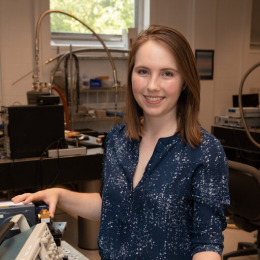
BME Engineering Education Research
Shape the future of learning through pioneering education research at Cornell University.
Engineering education research (EER) is the systematic study of education systems to create knowledge that defines, informs, and improves the education of engineers. Engineering education is a type of discipline-based education research (DBER) that emphasizes how education in an engineering context is unique from other areas of study. EER aims to develop innovative strategies that empower students to excel in their studies and become the next generation of engineers.
Faculty research interests

Alexandra Werth
Alexandra Werth’s primary research interest lies in investigating effective teamwork skills in engineering labs and other learning environments. She aims to address the challenge of fostering positive and productive teamwork for students, instructors, and advisors. Recognizing the need for a research-based assessment tool to evaluate students' teamwork knowledge, skills, and abilities, her work centers on developing an widely accessible assessment tool using evidence-centered design, specifically tailored to evaluate teamwork outcomes in engineering labs.

Jonathan Butcher
Jonathan Butcher’s lab integrates multi-scale computational modeling and micro scale experimental approaches to study the biomechanics and mechanobiology of cardiovascular soft tissue development, growth, remodeling, and disease. He pioneered the use of MicroCT for quantitative dynamic analyses of live embryonic growth and cardiac function. His group also uses molecular gain/loss strategies to understand how changes in adhesive signaling control heterogeneous cellular interactions critical for proper tissue architecture assembly in vitro and in vivo.

Chris Schaffer
Chris Schaffer’s lab employs light not only to visualize biological systems, but also for targeted ablation and manipulation. For example, using extremely short laser pulses, Schaffer’s lab causes localized injuries to individual blood vessels in the brains of rodents, triggering a small stroke. These targeted microstrokes allow the lab to study the role of microvascular lesions in neurodegenerative diseases such as Alzheimer’s disease.
Graduate Field Faculty
Susan Daniel, sd386@cornell.edu
Allison Godwin, afg64@cornell.edu
Brian Kirby, kirby@cornell.edu

